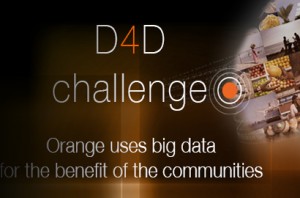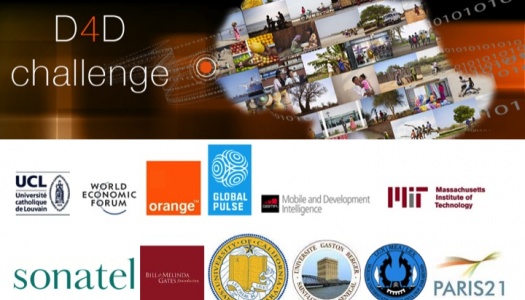National development and population welfare take centre stage as Orange announces the winners of its big data ‘Data for Development’ Challenge Senegal
The Data for Development (D4D) Challenge Senegal – a big data open innovation competition
Five research projects selected from categories spanning health, agriculture, transportation/urban planning, energy and national statistics
Five additional research projects selected for their contribution to the creative or scientific methodology or application of big data open innovation, such as big data ethics, anonymisation, data science, data crossing or data visualisation
Three post-challenge projects to be launched relating to health, national statistics and agriculture, backed by donors and partners to continue work and bring tangible and enduring benefits to the people of Senegal
The Data for Development (D4D) Challenge Senegal – a big data open innovation competition
 This year’s D4D Challenge Senegal was launched under the patronage of the Senegalese Ministry of Higher Education and Research and ran from 2014 to April 2015. In conjunction with Sonatel and Orange, anonymised data samples were extracted from Sonatel’s mobile network, under the recommendations of the Commission des Données Personnelles of Senegal (Privacy Protection Commission), and made available to over 250 international research laboratories. 250 universities registered for the challenge but the data was made available only to the 150 who worked on it. From these 150 teams, close to 60 high quality projects were submitted for the final competition.
This year’s D4D Challenge Senegal was launched under the patronage of the Senegalese Ministry of Higher Education and Research and ran from 2014 to April 2015. In conjunction with Sonatel and Orange, anonymised data samples were extracted from Sonatel’s mobile network, under the recommendations of the Commission des Données Personnelles of Senegal (Privacy Protection Commission), and made available to over 250 international research laboratories. 250 universities registered for the challenge but the data was made available only to the 150 who worked on it. From these 150 teams, close to 60 high quality projects were submitted for the final competition.
The challenge was organised around five core questions and themes relating to health, agriculture, transportation/urban planning, energy and national statistics; identified with the Senegalese Ministries or partner institutions, and designed specifically to challenge organisations to produce solutions for the purpose of societal development and the welfare of the population in Senegal. Special consideration was also awarded for progress made in data sciences, anonymisation, big data ethics and to foster greater involvement with local organisations and promote education in this growing field.
40% of the submissions received aim at improving transportation and urbanism in Senegal. Scientists also focused heavily on health with over 20% of submissions in this area. 15% of the submissions focused on national statistics with the remaining 25% spread between agriculture, energy, data visualisation and anonymisation.
2014-15 D4D Challenge Senegal Winners
The first prize goes to the University of Manchester and the Santa Fe Institute, with support from the Université Cheikh Anta Diop, winning US$5000.00 (approximately 4610.00 euros) for using mobile phone data for electrification planning. All other prize winners receive US$2000.00 (approximately 1840.00 euros) each.
In addition, three projects will be launched relating to health, national statistics and agriculture that have the backing of donors and partners to continue the work proposed in the challenge to deliver tangible and enduring benefits to the people of Senegal.
For the challenge itself, Orange and Sonatel provided its call data records (CDRs) covering 2013, anonymised through an intensive two-step process: these records were firstly anonymised locally in Dakar to remove all personal information; secondly, Orange and Sonatel transmitted the anonymised CDRs to its labs in Paris through a secured transfer, where the data was then packaged to prepare three data sets for the D4D challenge:
Matrix of Calls between antenna
Samples of customers’ mobility at the level of the 127 prefectures
Additional small samples of mobility at the level of antenna
The competition was overseen by an External Ethics Panel comprising 12 members from across academia, business, public and non-profit organisations and the final winning entries were selected by the D4D Committee.
This year’s winners of the D4D Challenge Senegal and ethics mention were announced at the NetMob Conference in Boston at the MIT MediaLab on 10 April 2015.
See Appendix 1 on (link) for full details of winners.
Energy Prize + First Prize: Using mobile phone data for electricification planning The University of Manchester , Sante Fe Institute, with support from the Université Cheikh Anta Diop
Agriculture Prize: Genesis of millet prices in Senegal: the role of production, markets and their failures Université catholique de Louvain
Health Prize: Uncovering the impact of human mobility on schistosomiasis (a water-based parasitic worm infection) Politecnico di Milano and Stanford University
National Statistics Prize: Virtual Networks and Poverty Analysis in Senegal University of Buffalo
Transport Prize: National and Regional Road Network Optimisation for Senegal Using Mobile Phone Data. Delft University of Technology
Data Crossing Prize: “Using mobile phone data for Spatial Planning simulation and Optimisation Technologies (SPOT)” University d’Avignon, Cheikh Anta Diop University, Laboratorie de Traitement de I’Information, Institute for Transport Planning and Systems, Zurich, (ESPACE), Avignon, France ; CNRS, France
Data Visualisation Prize: O05, Data for Development Reloaded: Visual Matrix Techniques for the Exploration and Analysis of Massive Mobile Phone Data, University of Technology, SynerScope BV, Sensemaking Fellowship
Practical Application Prize: Mobile Data as Public-Health Decision Enabler: A Case Study of Cardiac and Neurological Emergencies. Old Dominion University, University of Bordeaux, University of Tunis, Aalto University
Scientific Prize + Ethics Mention: Construction of socio-demographic indicators with digital breadcrumbs Freie University Berlin, Humboldt-University Berlin
Professor Vincent Blondel, University of Louvain, Research Affiliate, Massachusetts Institute of Technology, USA, and Chairman of the ‘D4D’ Committee, said: “One of the main hurdles still hindering progress in the field of Data for Development is enabling access to, and sharing, anonymous data in responsible ways that bring open innovation opportunities to local ecosystems. The approach demonstrated by Orange and Sonatel with D4D – by enabling multiple actors, enabling progress in a number of fields and identifying real potential for society impacts – has been really remarkable.”
Alioune N’diaye, CEO, Orange Sonatel, added: “We would like to sincerely thank the community of researchers who got involved in this adventure, the project partners and the Senegal Ministers who have agreed to take part by submitting their questions, as well as those who from near or far contributed to making ‘D4D Senegal’ such a success. It shows how the ICT sector can help the development of our country. It will be a starting point for aiding the development of Senegal and helping our fellow citizens to live a better life.”
Robert Kirkpatrick, Director of Global Pulse, United Nations, concluded: “A High Level Panel appointed by UN Secretary-General Ban Ki-moon has called for a « Data Revolution » to achieve sustainable development. Indeed, there is a tremendous opportunity in unlocking Big Data and utilising it alongside with traditional data to reveal new insights that can help combat societal challenges such as poverty, disease, and climate resilience. To deliver on the promise of big data for development, we must come together to learn to harness it safely and responsibly. D4D Senegal represents a milestone in mobilising a data revolution for sustainable development in Africa. All of the partners and participants of D4D Challenge Senegal embarked together on an effort that has yielded brilliant innovations which will inspire countless others to build upon.
As part of NetMob 2015, a school hackathon was organised by MIT for IT students in parallel with MIT students in Boston, students gathered by Simplon.co in Paris with the support of Orange researchers, and by Sonatel in Dakar (also called D4D datathon). The School Hackathon will be run in parallel on the three continents, a first of its kind, thanks to Orange Cloud for Business securely hosting the data sets and providing processing power.
For more information on the D4D Challenge, please visit D4D.Orange.com.
About Orange
Orange is one of the world’s leading telecommunications operators with sales of 39 billion euros in 2014 and 156,000 employees worldwide at 31 December 2014, including 99 400 employees in France. Present in 29 countries, the Group has a total customer base of 244 million customers worldwide at 31 December 2014, including 185 million mobile customers and 16 million fixed broadband customers. Orange is also a leading provider of global IT and telecommunication services to multinational companies, under the brand Orange Business Services.
Orange is listed on the NYSE Euronext Paris (symbol ORA) and on the New York Stock Exchange (symbol ORAN).
For more information on the internet and on your mobile: Orange.com, Orange-Business.com, LiveTV.orange.com or to follow us on Twitter: @orangegrouppr.
Orange and any other Orange product or service names included in this material are trademarks of Orange or Orange Brand Services Limited.



